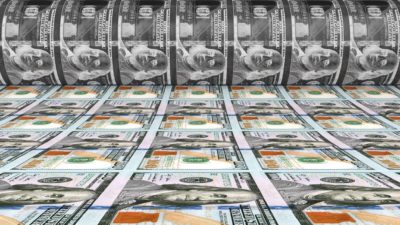This article was originally published on Fool.com. All figures quoted in US dollars unless otherwise stated.
A big drop sent the Dow down more than a thousand points
Market participants have been concerned for weeks about what Federal Reserve Chair Jerome Powell might say at the central bank's annual symposium in Jackson Hole. Apparently, they were quite discouraged by what they heard, as Powell restated the Fed's determination to push interest rates as high as they needed to go in order to ensure that inflationary pressures don't become permanently entrenched in the US economy. For those who had hoped for a more dovish response, that was bad news, and the Dow Jones Industrial Average (DJX: .DJI -3.03%) ended the day down more than a thousand points. Percentage drops for the S&P 500 (SP: .INX) and Nasdaq Composite (NASDAQ: .IXIC) were also in the 3% to 4% range.
| Index | Daily percentage change | Daily point change |
| Dow | (3.03%) | (1,008) |
| S&P 500 | (3.37%) | (141) |
| Nasdaq | (3.94%) | (498) |
Data source: Yahoo! Finance
Among large-cap stocks, there were only a handful of gainers as most share prices followed the broader market lower. Some now fear that the rebound that the market saw from mid-June to about a week ago may well prove to have been only a bear market rally, with today's downward move reestablishing a bearish trend that could take market indexes far lower.
There's no way to predict short-term price movements in the stock market. However, efforts to fight inflation, if successful, should result in better long-term results for investors than if the Fed simply backed off and allowed higher price trends to become a permanent feature of the US economy.
Stubborn inflation
The big question still facing investors is whether inflation has peaked. Many of those watching economic data were pleased to see the upward moves in the Consumer Price Index (CPI) and the Personal Consumption Expenditures Price Index (PCE) start to moderate recently. However, just because inflation has stopped accelerating doesn't mean that it's under control.
The latest numbers from the Bureau of Economic Analysis on the PCE tell the story well. The headline number that most people emphasised was that the price index fell 0.1% in July, with goods prices falling 0.4%.
However, looking more closely at what goes into the PCE price index gives a more complete picture. Much of the downward pressure on the index came from a 7.7% drop in the sub-index for gasoline and other energy goods. That by itself was enough to send nondurable goods prices down half a percent, even as food and beverage prices jumped 1.3% month over month.
Some other key components showed continued rises. Housing and utility costs were up 0.6% for the month, extending their gain over the past 12 months to 7%.
Perhaps most importantly, even larger declines in a single month wouldn't by themselves reverse adverse trends. Energy costs are still more than 45% higher than they were this time last year. Food and beverages are up nearly 12% year over year, and even when you exclude food and energy, core PCE prices are up 4.6% since July 2021 — more than double the 2% target that the Fed pursues.
Is a recession worth long-term prosperity?
Investors worry that a prolonged set of interest-rate increases from the Fed will push the economy into recession and restrain business activity. If that view from the Fed was unexpectedly hawkish, then it could leave stock market participants facing downward revisions on earnings estimates that could send stock prices lower once again.
In the long run, though, the impact of inflation on stock prices historically has been more difficult to overcome than short-term business cycle fluctuations. When you look back at recent bouts of inflation in the 1970s and early 1980s, for instance, you'll notice significant volatility in stock markets that led to subpar returns. Only when inflationary pressures were resolved did solid bull markets result, and the long bull markets of the 1990s, mid-2000s, and 2010s all came in economic environments with little or no inflation.
It's indeed possible that a central bank with tight monetary policy might bring short-term pain to the stock market and an end to what might materialise as a bear market rally. However, I believe investors will be happier with this outcome in the long run than they would be with sustained inflation and the complications that come with it.
This article was originally published on Fool.com. All figures quoted in US dollars unless otherwise stated.







